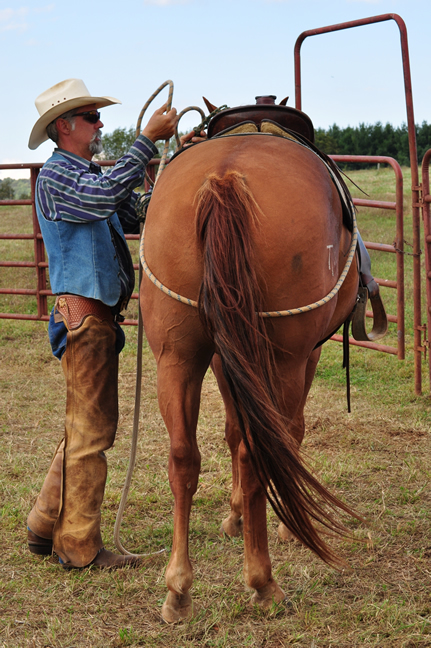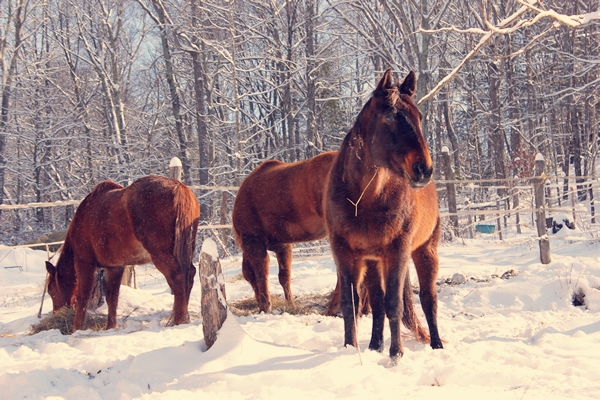Read Part 1 Of this Story
The sleet turned back to snow and fell so hard the tree line some 50 yards from the house wasn’t visible at moments. Another reason Carol and I don’t worry too much about this sort of thing is that we are always pretty prepared for trouble around here. We expect it, and the lifestyle accommodates it. We grow and can much of our own food, so in December, the pantry is plenty full with colorful jars. We have potatoes and sweet potatoes stored up by the bushel. There was plenty of hay on hand that year. We heat the house with wood and cook with propane, so our inconvenience was limited.
On top of all that, we have solar power. For a decade we were totally off-grid, but by the time this Christmas came around, we had brought in grid power but retained our solar panels and deep cycle batteries. The problem was that lightning had taken out our inverter the summer before and we had not yet been able to replace it. This left us with no backup power, and the big problem when that happens is that we can’t run the well pump. We had a pretty good store of drinking water in plastic bottles in the pantry, so we wouldn’t die from thirst even if we were stranded for days. But we had a house full of people, and that means a lot of dirty dishes and more than a few flushes.
Everything went smoothly with the food fixins, and other than the sadly unilluminated Christmas tree, we had fun watching the snow, playing cards, and just catching up on life. After the mid-afternoon main Christmas dinner, the true trouble began to show. Dirty pans and dishes were piled everywhere. We all caught ourselves habitually turning faucet handles and flipping light switches even though we knew better.
The roads by this time were really bad. With the wind and cold snowy forecast, the drifts would continue to pile up and re-cover the roads that did get plowed. There wasn’t even a hope of folks leaving or the power coming back on for a couple of days. Something had to be done to get some water to the house or with a crew this big our good holiday cheer shortly would start to suffer severely.
 I thought about melting snow in a pot or two on the wood stove, but if you’ve ever tried that task you know it takes about ten feet of snow to get a cup of water—that would never cover even a handful of flushes in a day. No, we needed something much more bold. I remembered the spring down in the valley. Carrying water uphill that distance in this weather wouldn’t be much better than melting snow. We didn’t have a tractor at the time and there was no way to get the truck back out if I drove down there. Hmm…but then it occurred to me, I had Jubal (The Wonder Horse)! That burly beast could easily lug both me and a ton of water up out of the valley. I got my plan together.
I thought about melting snow in a pot or two on the wood stove, but if you’ve ever tried that task you know it takes about ten feet of snow to get a cup of water—that would never cover even a handful of flushes in a day. No, we needed something much more bold. I remembered the spring down in the valley. Carrying water uphill that distance in this weather wouldn’t be much better than melting snow. We didn’t have a tractor at the time and there was no way to get the truck back out if I drove down there. Hmm…but then it occurred to me, I had Jubal (The Wonder Horse)! That burly beast could easily lug both me and a ton of water up out of the valley. I got my plan together.
I got a rope halter and fetched Jubal out of the paddock in the bottom and led him up to the house to the tack room. A layer of ice and snow covered his back which I curried off the best I could and tacked him up in a western saddle and bridle with rope mecate reins. That was the easy part. My plan was to get a bunch of gallon jugs (luckily Carol had been saving them all summer to use as mini tomato green houses in the spring), run my rope through the handles, and then take a dally and have Jubal drag the lot of them over the icy snow. Great plan, but there was the issue of Jubal’s fear about ropes. And, I wondered how plastic jugs scootching along the gritty snow would add to his concern, especially being behind him.
I gathered a school of jugs and threaded the handles onto a long rope. These I dragged along behind me while I led Jubal a short distance across the yard. He was uncertain at first and danced around anytime the plastic jugs moved on the icy ground. The heavy raining of ice pellets and wind combined to make a constant roar around us, not helping to ease Jubal’s mind. My boots and Jubal’s unshod feet crunched through several inches of the snow/sleet mix with each step.
As I dragged the empty jugs and walked along side the big gelding I would move the rope closer to his side and towards the saddle horn. When he showed apprehension I’d hang in there until he’d give at least a hint of relaxation about it and then I’d take the rope away and pet on him. We repeated this process over and over and he got better and better about the rope and the load behind him. The worst part was that the saddle was starting to look like the road with an opaque white icy frosting, which I knew was going to be a bum freezer when I got aboard.
Finally, I was able to reach over and take a dally on the saddle horn and for about the last half of the trip down to the spring, Jubal pulled the empty jugs himself as I led him from the side.
A short PVC pipe stuck out of the dam and clear spring water poured out in a constant stream. I held the lead rope from the mecate, not wanting to risk tying Jubal to a tree as he was getting very jittery being away from his buddies and in a strange situation, and multitasked filling the jugs. I’d brought 15 or 20. It took awhile to get the lot of them topped out, capped, and then restrung on the rope while trying to keep a jittery Jubal focused and steady. Finally, I had them all set. I tested the load and it was a heavy pull, even over the inches of sleety snow on the ground. My hands were freezing and I stuck them under Jubal’s thin mane until the stabbing pain subsided.
I turned Jubal to face the direction we needed to head for home and backed him up to the load. I cleared the saddle of ice the best I could, took a handful of rein and mane in one hand, had the water jug rope and cantle in the other, put a foot in the stirrup, and pulled myself up.
When Jubal first came to me he was terrible about walking off when I’d go to mount. I’d worked a bunch on getting his mind centered with me in general, and when I was successful with that when going to mount, he’d stand fine. He wasn’t the best this time…the situation was big for him considering the adverse conditions, and I wasn’t handy enough to get him mentally with me in such a spot. Not to mention I was anxious to see how it would go. With the trees whipping wildly all through the valley, Jubal stepped ahead the second I got my leg across him.
Luckily, he backed when I asked him to with the reins, but he stayed put only a second before piaffing to charge ahead. I backed him again, took a dally, and tried to ease him forward. I could feel the weight of the water stretch the rope tight as I floated Jubal some slack on the reins. The muscular Quarter Horse shot forward, the cloud of white jugs slid along the sleet behind us, and off we went!
Once moving, things smoothed out. The first leg of the trip proved super easy because the gelding wanted to return to his buddies and a pile of hay which were on the way to the house. Once there, it took some urging from the saddle to put that in his rear view mirror, but I managed.
We arrived in the yard by the house with our precious load of water. A few jugs had busted and drained along the way, but at least three-quarters of them made the journey intact. I dropped my dally, dismounted, untacked Jubal, and then got The Wonder Horse turned out again with Festus and the others, and his hay. I returned to the house and began hauling the jugs inside; the relief of the humans was palpable. We flushed and washed dishes, and getting the place cleaned up made a huge improvement in moral.
The story didn’t end there…it was two days before the kids got out, and two more before we had power again, but Jubal and I made more water runs and by providing this present to us, Jubal really did save Christmas that year. When I reflect on this fairly simple, yet enormously helpful, role a horse played in my life, my mind wanders further and considers how horses really have helped shape humanity’s modernity and how much we have to thank them for.
The horse was the very first means by which we were able to travel beyond the speed of our own flat feet. The horse altered our sense of time when for the first time ever a letter could outpace a pedestrian when carried by a rider or wagon, and goods could be moved around en mass. Still today in country that cannot be accessed by trucks, four wheelers, or motorcycles, horses make it possible to open up the land for ranching and managing cattle and other stock to produce food and goods for people. The list goes on and on.



